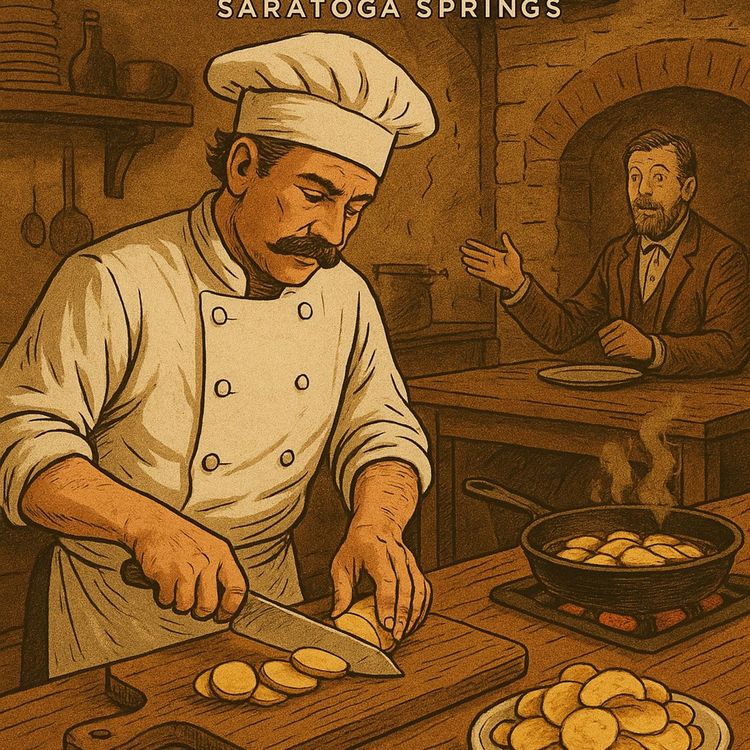This is an automatically generated transcript. Please note that complete accuracy is not guaranteed.
Did you know the invention of the potato chip was an accident? Welcome to our podcast, as we dive deep into the overlooked twists and turns of history that change the way we live, eat, move, and think. In this episode, we’re crunching into the crispy, salty origin of one of America’s favorite snacks, the potato chip. It’s the story of how one man’s frustration with a customer led to the birth of a billion dollar industry. Let’s set the scene.
The year is eighteen fifty three. The place Saratoga Springs, New York, a popular resort town, particularly among the wealthy elite who traveled there for its mineral springs, lush forests, and upscale hotels. One of those hotels, Moon’s Lake House, was known for its fine dining and scenic lake views. The kitchen at Moon’s Lake House was run by George Crumb, a half African American, half Native American chef.
Crumb had built a reputation for his culinary skill, specially when it came to game meets in regional cuisine. But as the story goes, Crumb had a difficult night ahead of him. A finicky diner, some say it was railroad magnate Cornelius Vanderbilt himself kept sending his fried potatoes back to the kitchen. Too thick, too soggy, not salty enough.
This went on several times. Finally Crumb decided to prove a point. He sliced the potatoes paper thin, fried them until they were crisp, and sprinkled them heavily with salt. Surely, he thought these would be too crunchy and too salty for anyone’s taste.
But to his surprise, the customer loved them. Loved them so much, in fact, that they became an instant hit. Thus the potato chip, or Saratoga chip, as it was first known, was born. Words spread fast.
Guess UN’s Lakehouse began requesting the chips by name. Other restaurants in the area took notice and started adding their own versions to their menus. Within a few years, the Saratoga Chip had become a regional delicacy, but Crumb didn’t patent or mass market the invention. In fact, the chips remained a local specialty for decades.
Crumb eventually opened his own restaurant in Saratoga Springs, where a basket of chips was served at every table. His success as a restaurateur was notable for the era, especially for a man of color. It wasn’t until the nineteen twenties and thirties that the potato chip truly went national. The rise of industrial food processing and packaging opened new doors.
Entrepreneurs like Herman Lay began selling chips door to door in the South. Lay’s company eventually became the foundation of Fredo Lay, which is now part of PepsiCo, and with the rise of national advertising, supermarket chains, and postwar consumerism took off. Americans were snacking more than ever before. By the mid twentieth century, chips weren’t just a novelty, they were a staple.
Of course, that success came with changes. Early chips were made fresh and served locally, but mass production required new methods of preservation and uniformity. Vacuum sealed bags were introduced. Flavor powders like barbecue and sour cream and onion revolutionized the snack aisle.
Automation replaced the hand slicing crumb once did with knives. Still, the basic formula thinly sliced fried potatoes remained untouched, and the accidental brilliance of George Crumb’s rebellious recipe endures in every bag you open today. But let’s pause for a second to reflect on the bigger picture. This story is about more than just a snack.
It’s about creativity under pressure. It’s about a man marginalized by race and era who made it. Is marked not through corporate backing or global infrastructure, but through boldness and ingenuity in the kitchen. George Crumb didn’t intend to start a snack food empire.
He was annoyed, He reacted, and he stumbled onto something that resonated with people’s palates and their culture in ways no one could have predicted. It’s also a story about how ideas spread. The chip might have stayed local if not for others who saw its potential. Its journey from a single table in Saratoga to every gas station shelf across the country is a testament to how simple ideas can travel far when conditions are right.
The next time you hear the crunch of a potato chip, think about that night in eighteen fifty three, a frustrated chef, a demanding guest, a thin slice of rebellion, and a taste that changed history. Thank you for joining us on did you Know. If you enjoyed this story, be sure to subscribe, rate, and share it with someone who loves a good origin story. And don’t forget to stay curious, because sometimes history’s biggest flavors come from the smallest mistakes.
For more information on our podcasts, visit our website did you Know? Dot life Dot Until next time, stay curious.




